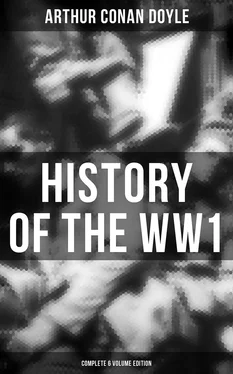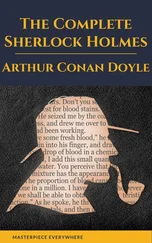To take events in their order: beyond numerous gallant affairs of outposts, there was no incident of importance until the evening of November 23, when the Germans, who had seemed stunned for a week or so, showed signs of returning animation. On this day, some eight hundred yards of trench held by Indian troops in the neighbourhood of Armentières were made untenable by the German artillery, especially by the Minenwerfer —small mortars which threw enormous bombs by an ingenious arrangement whereby the actual shell never entered the bore but was on the end of a rod outside the muzzle. Some of these terrible missiles, which came through the air as slowly as a punted football, were 200 lbs. in weight and shattering in their effects. There was an advance of the 112th Regiment of the Fourteenth German Corps, and the empty trenches were strongly occupied by them — so strongly that the first attempt to retake them was unsuccessful in the face of the rifle and machine-gun fire of the defenders. A second more powerful counter-attack was organised by General Anderson of the Meerut Division, and this time the Germans were swept out of their position and the line re-established. The fighting lasted all night, and the Ghurkas with their formidable knives proved to be invaluable for such close work, while a party of Engineers with hand-bombs did great execution—a strange combination of the Asiatic with the most primitive of weapons and the scientific European with the most recent. It was a substantial victory as such affairs go, for the British were left with a hundred prisoners, including three officers, three machine-guns, and two mortars.
The first week of December was rendered memorable by a visit of the King to the Army. King George reviewed a great number of his devoted soldiers, who showed by their fervent enthusiasm that one need not be an autocratic Warlord in order to command the fierce loyalty of the legions. After this pleasant interlude there followed a succession of those smaller exploits which seem so slight in any chronicle, and yet collectively do so much to sustain the spirit of the Army. Now this dashing officer, now that, attempted some deed upon the German line, and never failed to find men to follow him to death. On November 24 it was Lieutenant Impey, with a handful of 2nd Lincolns; on November 25, Lieutenants Ford and Morris with a few Welsh Fusiliers and sappers; on November 26, Sir Edward Hulse with some Scots Guards; on the same day. Lieutenant Durham with men of the 2nd Rifle Brigade—in each case trenches were temporarily won, the enemy was damaged, and a spirit of adventure encouraged in the trenches. Sometimes such a venture ended in the death of the leader, as in the case of Captain the Honourable H. L. Bruce of the Royal Scots. Such men died as the old knights did who rode out betwixt the lines of marshalled armies, loved by their friends and admired by their foes.
December 9 was the date of two small actions. In the first the 1st Lincolns of the 9th Brigade, which had been commanded by Douglas Smith since the wounding of General Shaw, made an attack upon the wood at Wytschaete which is called Le Petit Bois. The advance was not successful, the three officers who led it being all wounded, and forty-four men being hit. The attempt was renewed upon a larger scale five days later. The other action was an attack by the enemy upon some of the trenches of the Third Corps. This Corps, though it had not come in for the more dramatic scenes of the campaign, had done splendid and essential work in covering a line of fourteen miles or so against incessant attacks of the Germans, who never were able to gain any solid advantage. On this occasion the impact fell upon Gordon’s 19th Brigade, especially upon the 2nd Argyll and Sutherland Highlanders and the 1st Middlesex. It was driven back with heavy loss.
On December 14 the second and more sustained effort was made to get possession of the Petit Bois at Wytschaete, which had been attacked by the Lincolns upon the 9th. D’Urbal’s Eighth French Army was co-operating upon the left. The British attack was conducted by Haldane’s Third Division, and the actual advance was carried out, after a considerable artillery preparation from the batteries of two Corps, by Bowes’ 8th Brigade, with the 2nd Royal Scots and the 1st Gordons in the lead. At 7:45 the guns were turned upon the big wood beyond Petit Bois, through which the supports might be advancing, and at the same hour the two regiments named swarmed forward, the Lowlanders on the left and the Highlanders on the right. The Royal Scots, under Major Duncan, carried Petit Bois with a rush, taking fifty prisoners and two machine-guns, while the Germans fled out at the other end of the wood. The Scots at once entrenched themselves and got their own machine guns into position. The Gordons, under Major Baird, advanced with splendid dash and gained some ground, but found the position such that they could not entrench upon it, so they were forced to fall back eventually to their original position. Both they and the 4th Middlesex, who supported them, lost considerably in the affair. The total casualties in the Petit Bois action came to over four hundred, with seventeen officers, figures which were considerably swollen by the losses of the Suffolks and Irish Rifles, who continued to hold the captured position in the face of continued bombing. The French in the north had no particular success and lost 600 men. The importance of such operations is not to be measured, however, by the amount of ground won, but by the necessity of beating up the enemies’ quarters, keeping them pinned to their positions, and preventing them from feeling that they could at their own sweet wills detach any reinforcements they chose to thicken their line upon the Eastern frontier, where our Russian Allies were so insistently pressing.
On the morning of December 19 an attack was made upon the German lines in the Festubert region by Willcocks’ Indian Corps, the Meerut Division, under General Anderson, attacking upon the left, and the Lahore, under General Watkis, upon the right. The object of the movement was to co-operate with the French in an advance which they had planned. The Meerut attack was successful at first, but was driven back by a counter-attack, and some hundreds of Indian infantry were killed, wounded, or taken. In the case of the Lahore attack the storming party consisted of the 1st Highland Light Infantry and the 4th Ghurkas. Both of these units belong to the Sirhind Brigade, but they were joined in the enterprise by the 59th Scinde Rifles of the Jullundur Brigade. These latter troops had a long night march before reaching the scene of the operations, when they found themselves upon the right of the attack and within two hundred and fifty yards of the German trenches. Judging the operations from the standard reached at a later date, the whole arrangement seems to have been extraordinarily primitive. The artillery preparation for a frontal attack upon a strong German line of trenches lasted exactly four minutes, being rather a call to arms than a bombardment. The troops rushed most gallantly forward into the dark of a cold wet winter morning, with no guide save the rippling flashes of the rifles and machine-guns in front of them. Many were so sore-footed and weary that they could not break into the double. Some of the Indians were overtaken from behind by a line of British supports, which caused considerable confusion. An officer of Indians has left it on record that twice running he had a revolver clapped to his head by a British officer. All of the battalions advanced with a frontage of two companies in columns of platoons. Both the Ghurkas and Highlanders reached the trench in the face of a murderous fire. The left of the 59th, consisting of Punjabi Mahomedans, also reached the trench. The right, who were Sikhs, made an equally gallant advance, but were knee-deep in a wet beetroot field and under terrific machine-gun fire. Their gallant leader, Captain Scale, was struck down. as was every Indian officer, but a handful of the survivors, under a Sikh Jemadar, got into a German sap, which they held for twenty-four hours, taking a number of prisoners.
Читать дальше












